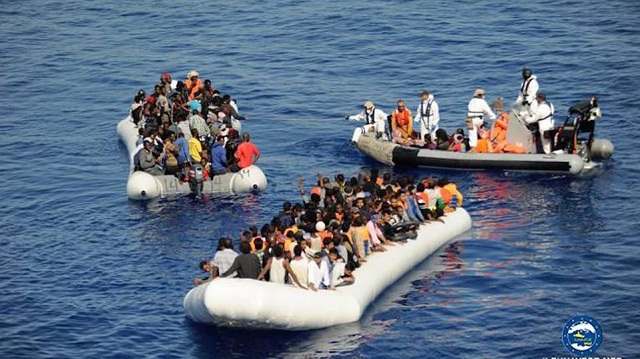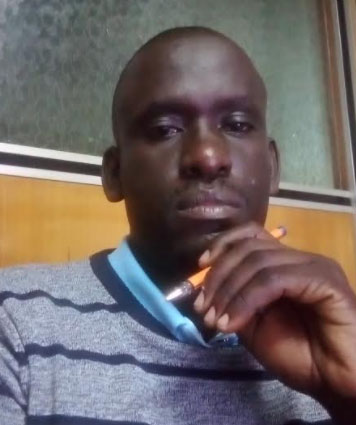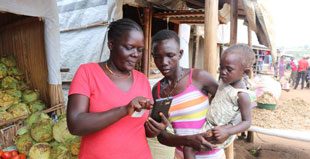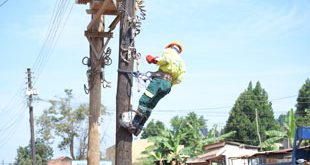
COMMENT | Samson Tinka | Human trafficking is the trade of humans for the purpose of forced labor, sexual slavery, or commercial sexual exploitation for the trafficker or others. This may encompass providing a spouse in the context of forced marriage, or the extraction of organs or tissues, including for surrogacy and ova removal.
Human trafficking can occur within a country or trans-nationally. Human trafficking is a crime against the person because of the violation of the victim’s rights of movement through coercion and because of their commercial exploitation. Human trafficking is the trade in people, especially women and children, and does not necessarily involve the movement of the person from one place to another.
People smuggling (also called human smuggling and migrant smuggling) is a related practice which is characterized by the consent of the person being smuggled. Smuggling situations can descend into human trafficking through coercion and exploitation. Trafficked people are held against their will through acts of coercion, and forced to work for or provide services to the trafficker or others.
Three things are present in the act of trafficking in persons namely, ACT, MEANS AND PURPOSE/EXPLOITATION.
The act involves recruiting, transporting, transferring, harboring, receiving of persons trafficked whereas means is the use of force, threats, abduction, fraud, deception, abuse of power as a way of getting persons to traffic while purpose is the reason for trafficking including prostitution, pornography, sexual exploitation, forced labor, slavery, debt bondage, forced child marriage, human sacrifice, financial gain, and witchcraft.
This week, 30th July 2022 will be a world day against trafficking in persons. It will be observed in Uganda and the major players in fighting trafficking in persons will hold different activities geared to inform the public of this vice, how it is conducted, the major players, the possible victims, how it can be fought and how victims can be re-integrated into their communities.
This year’s theme focuses on the role of technology as a tool that can both enable and impede human trafficking.
With the global increase in the use of technology – intensified by the COVID-19 pandemic and the shift of everyday life to online platforms — the crime of human trafficking has conquered cyber space. The internet and digital platforms offer traffickers numerous tools to recruit, transport, exploit, and control victims; organize their accommodation; advertise victims and reach out to potential clients; communicate among perpetrators; and hide criminal proceeds – and all that with greater speed, cost-effectiveness and anonymity.
The situation in Uganda
Trafficking in persons can be both locally, regionally and internationally.
In Uganda, Trafficking in persons common known as TIP is very common. In some regions like Karamoja, children are trafficked to Mbale, Jinaj, Kampala and other urban centers for different reasons like child labor, street begging, and child sacrifice among other reasons.
However, in the use of technology also lies great opportunity. Future success in eradicating human trafficking will depend on how law enforcement, the criminal justice systems and others can leverage technology in their responses, including by aiding investigations to shed light on the modus operandi of trafficking networks; enhancing prosecutions through digital evidence to alleviate the situation of victims in criminal proceedings; and providing support services to survivors. Prevention and awareness-raising activities on the safe use of the internet and social media could help mitigate the risk of people falling victim to trafficking online. Cooperation with the private sector is important to harness innovation and expertise for the development of sustainable, technology-based solutions to support the prevention and combatting of human trafficking.
Trafficking in persons Figures
In Uganda, the figures are worrying, as between January 2022 and June 30th 2022, over 1000 cases of TIP have been registered as follows, Jan 2022-13 cases, Feb 2022-288, March 2022-199, April 2022-346,May 2022-107 and June 2022-117. These are huge numbers and some cases are not formerly registered.
Prosecution
Over 1044 suspects have been produced in different courts of law in Uganda and 125 persons convicted. This represents 11%, which is a small figure. So many factors come into play when it comes to litigation and these factors largely frustrate the prosecution. Witnesses shy away from going to courts, investigators are largely facilitated fully to pick up necessary information, exhibits, carry out research, prosecutors are compromised etc. TIP is not a cheap venture, facilitators of this vice are highly connected and financially sounding. They are capable of frustrating litigation at any cost. Imagine trafficking someone for removal of internal organs. The buyers are rich and capable of spending dimes to kill a case.
Who are the major players in fighting TIPs
Key players in the fight against TIP are local leaders, airlines, security agencies, judiciary, clearing agents, Ticketing companies, parents, labor export companies, immigration and NGOs.
Local leaders play a critical role towards ending TIPs. Some form of paper work is needed at a certain time and these papers always originate from local leaders. Before they issue these papers, they should tick boxes of the requestors’ intentions. Similarly, security agencies especially at boarder points whether airport, sea or land boarders, they should be keen enough on the travelers especially first time young adults of both sexes. Immigration officers are the last people to close the gap. They carry a big weight in fixing this problem of TIP.
This does not mean that they should stifle movement of people but when it comes to regional and international TIP they are a big pillar to lean on. Ask relevant questions; probe further when the need arises. Save that person. Remember the person being trafficked is in most cases not knowing or even unwilling to be trafficked. He is is either threatened, coerced, forced, bribed, lied etc. it’s possible to save someone at this point of exit. Whereas both TIP locally and internationally is bad, the international one is more dangerous because the dynamics are different. Trafficked person in a local forced marriage can run away, a street kid can be rehabilitated, but trafficked person in Oman, Saudi can get out easily. Religious leaders also can crusade against this problem. Make it part of your preaching all the time. TIP is real and the victims go a long way to recover.
People being trafficked need to know and consult widely. Do not be fooled into promises of big monies. Confine in your friend, relative and local leader. Google the company promising you a job. Listen to your inner feelings. Check with ministry of gender labor and social development if this person/company is licensed to carry out this labor export business. If corned, and the trafficker is tight on you, reveal to immigration officer or airliner you will be rescued.
Government need to invest resources in fighting TIP especially through awareness. NGOs are trying but they need a lot of support. International migration organization-IOM has been conducting seminars and workshops to major aviation players on TIP, this is a good step. Such trainings should be extended to local leaders especially on the areas marked red as far as TIP is concerned like Karamoja sub region, Kampala and other places. Government should support fully without hesitation labor export sector.
Unemployment in Uganda is high, need for labor worldwide is there, any mindful thinking government officer should never think of suspending, slowing stopping labor migration. This will create and sustain TIP avenues.
People google and know where jobs are, by suffocating labor export, you creating avenues of TIP. TIP facilitators will dance obangaina when there is some form of stopping labor export. As it is now stopping of labor export is close to impossible. I was in UAE recently the good stories of Ugandans working in UAE where in formal or informal jobs are un-displaceable. Support streamline this sector and this does not mean creating red tapes here and there. For example, create one stop center for labor export sector. These offices can house immigration, passport, MOGLSD, MOH for medical checkups, security agencies for clearances etc. this is possible.
Working in silos is outdated, out fashioned and no longer needed. Support labor export companies ina short time. Instead, government is creating offices and offices as form of streamlining. No way, this is old fashioned. We need to export labor in hundreds and thousands. Some countries like Bangladesh, Philippines, and Pakistan earn a lot through a streamlined but supported labor export sectors by governments.
Finally, you and I are both potential TIP promoters but at the same time, we can fight it through possible simple ways like critical observations, asking right questions, reporting any suspicious TIP person, helping the victims etc.
Let us say no to TIP today so that we have no TIP in the near future.
 Samson Tinka is a safety and security consultant | Director Matts Secure Solutions Ltd | tindsam@yahoo
Samson Tinka is a safety and security consultant | Director Matts Secure Solutions Ltd | tindsam@yahoo
 The Independent Uganda: You get the Truth we Pay the Price
The Independent Uganda: You get the Truth we Pay the Price



